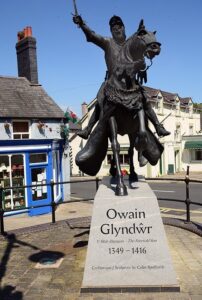Matthew Gough
Matthew Gough
 Matthew Gough is a character to which no formal official title but sometimes seen as quoted as a Sir or Knight, but he did spend most of his life fighting the French and had lands in Maine. The Genealogy of Matthew is a little foggy and anything written (including what is here) should be taken with a healthy dose of scepticism.
Matthew Gough is a character to which no formal official title but sometimes seen as quoted as a Sir or Knight, but he did spend most of his life fighting the French and had lands in Maine. The Genealogy of Matthew is a little foggy and anything written (including what is here) should be taken with a healthy dose of scepticism.
Early Life
Matthew was born about 1390 (or as early as 1383) in Maelor (near Wrexham) in Wales. It is supposed he was the son of Owain Gough (a bailiff) and Hawys Hanmer. It has been argued that he was the nephew or at least related to Owain Glyndŵr, the Prince of Wales. An even bigger pinch of salt is needed for his marriage and children as one report says he got married at the age of 53 years of age and married Margaret and had 4 children Geoffrey, Matthew, David and Margaret, all born in England.

Owain Glyndŵr had married Margaret Hanmer which may have been his mothers sister. Owain Glyndŵr rose up in rebellion in 1400 – 1415 but our Matthew seems o have not taken any part in the rebellion. Matthew would have been 10 (or 17 depending on actual date of birth) when the uprising started so why was he not involved?
A possible answer to this may also be linked with his mother as it is also reported that she was nurse to the Baron Talbot’s family, and he might have grown up with the future Earl of Shrewsbury or at least became a squire/soldier of that household for those years (purely speculation but it would fit the storyline). Whatever the reason, he became one of the most seasoned soldiers England had in France.
His popularity back home and with his commanders in France is undoubted and there are even poems written about him (which is not unusual of the time). He served with John Talbot (Earl of Shrewsbury), Sir John Fastolf and John Beaufort (Earl of Somerset). The latter actually paid for Matthew directly himself out of his own pocket.
Military Career
However, his war record is not always the best but impressive with at least 25 years plus action:
- 1423 – Participated in the Battle of Cravant, an impressive English/Burgundian victory.
- 1424 – Participated in the Battle of Verneuil, another English/Burgundian victory, so impressive was the victory it was called the second Agincourt.
- 1427 – He captured the “Bastard of Baume”
- 1428 – Involved in the retaking of LeMans.
- 1429 – Was besieged at Beaugency and surrendered the town, unaware of a relief force of 4,000 men were already on route to him.
- 1431 – Attacked a French relief force who had come to the aid of the besieged town of Saint Ceneri. After an initial success he was over powered and captured.
- 1435 – Was captured whilst on route to Meulan.
- 1440 – Participated in the siege of Harfluer.
- 1444 -Was placed in charge of recruiting out of work soldiers for the dauphin, during the truce between England and France.
- 1447-8 Was charged with overseeing the handing over of LeMans and Maine. Something which he found particularly distasteful – He had lands in Maine too. On the handing over the keys to LeMans to the French he announced that the English would return if the French did not keep to the agreement.
- 1449, November 20 – Surrendered the fortress of Belleme to the French
- 1450, April 15 – Battle of Formigny. A huge English disaster in which he escape to Bayeux taking 2,000 soldiers with him. The remainder of forces caught at Formingny without any ransom importance were put to death. 3,674 English bodies were buried in 14 grave pits.
- 1450, May 16 – after repulsing two assualts at Bayeux, he surrendered the town to the French.
I‘m sure there is much more to his military career than I have reported. In early June, Matthew finds himself in the Tower of London just when Jack Cade and his rebels enter London.
Poem (English Translation)
A man from Maelor, delightfully civilized,
a man who shattered spears;
a famous man from Trefor as far as Rouen,
vigorous, and Einion’s grandson;
a man who is descended from Rhys and he’s an eagle,
he is a man of distinction for the Crown.
